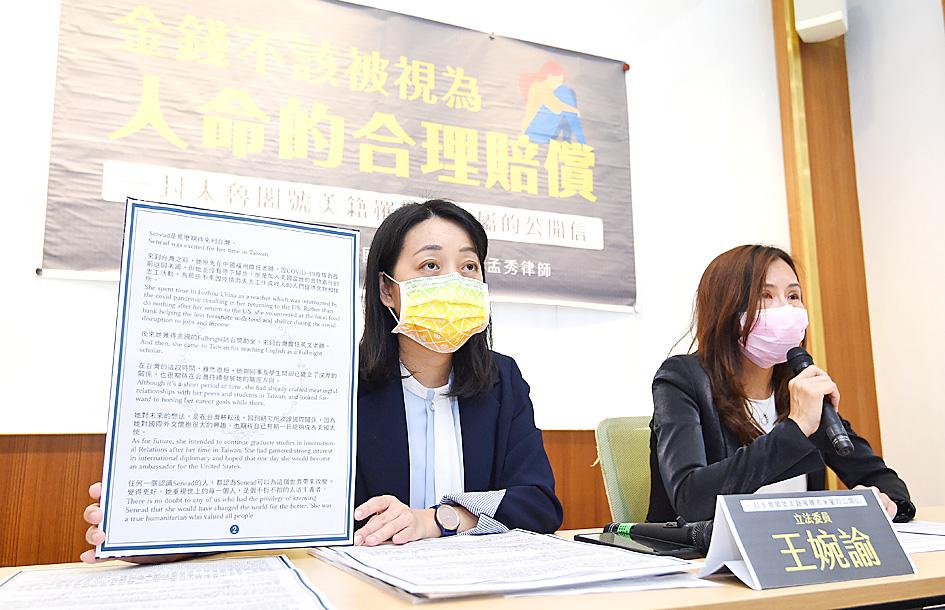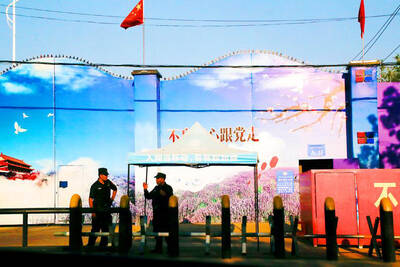The parents of American Senead Short, who died in the Taroko Express No. 408 derailment last month, yesterday said in a pre-recorded video that they are seeking more compensation from the Taiwan Railways Administration (TRA), citing the “gross negligence” that led to the death of their daughter.
Compensation from the railway agency should be used to set up a foundation in honor of their daughter and ensure the safety of the TRA system, Kent and Joy Short said.
The 24-year-old Iowan, who taught English as a Fulbright award winner in Taiwan, was one of 49 people killed in the accident in Hualien’s Sioulin Township (秀林) on April 2.

Photo: Liao Chen-huei, Taipei Times
The video was shown at a news conference yesterday held by New Power Party Legislator Claire Wang (王琬諭) and attorney Cirasmita Chen (陳孟秀).
“As we know, Taiwan Railways will make a compensation payment of NT$15 million [US$536,116]. We also learned that Taiwan’s Ministry of Health and Welfare will distribute donations in the amount of NT$15 million to the families of 49 people who were killed in this train crash,” Joy Short said in the video.
“The people of Taiwan have been very supportive to the victims of this tragedy. For this we are truly grateful... However, we are concerned that in this tragedy, the interests of Taiwan Railways appear to have outweighed the safety of the people,” she said.
“We brought legal actions precisely for the purpose of ensuring the safety of Taiwan Railway’s operations and preventing other tragedies in the future,” she said.
While recognizing that the compensation is no small amount of money, Joy Short said it should never be considered appropriate compensation for their daughter’s life.
Citing the investigation report on the derailment of a Puyuma Express train that claimed 18 lives on Oct. 21, 2018, which showed the incident was caused by excessive speed and an inactive train protection system, Kent Short asked whether the issues were fully addressed or resolved prior to the tragedy that claimed their daughter’s life.
“Even before that, did Taiwan Railway ever implement any corrective measures following the incident dating back to 1981? Has Taiwan Railways resolved these issues?” he asked. “If not, wouldn’t such failure justify an even higher amount of compensation by Taiwan Railways?”
On March 8, 1981, a Tzuchiang Express train hit a gravel truck at a railway crossing, killing 30 passengers and injuring 130.
“We are not interested in financial gain for our own use and for any compensation. In fact, we believe that compensation for Taiwan Railways’ gross negligence should be used to establish a foundation in honor of Senead towards helping people around the world,” he said. “This is what she would have wanted, and in fact was the way she had been living her life.”
Pursuing a higher amount of compensation is the only way to push Taiwan Railways to ensure people’s safety, the Shorts said.
“The last thing we want to see is for any other parents in this world to suffer from such tragedy and forever struggle through the life of pain without one’s beloved,” they said.
In the video, the Shorts also remembered their daughter as an artist, a ballet dancer, a linguist who spoke French, Arabic and Mandarin, an honor student, a reader and a world traveler.
Senead Short had intended to continue graduate studies in international relations after her time in Taiwan, as she had gained a strong interest in international diplomacy and hoped one day that she would become an ambassador for the US, they said.
Chen, who has been retained by the Shorts to handle legal proceedings, said that prosecutors are investigating evidence related to criminal lawsuits, but the railway agency is also facing civil lawsuits that would determine the amount of compensation given to the victims.
“Taiwan should never forget those killed or injured in the fatal accident. We should continue overseeing the TRA so that it properly handles the aftermath of the derailment and thoroughly reforms its operations,” she said.

Former Czech Republic-based Taiwanese researcher Cheng Yu-chin (鄭宇欽) has been sentenced to seven years in prison on espionage-related charges, China’s Ministry of State Security announced yesterday. China said Cheng was a spy for Taiwan who “masqueraded as a professor” and that he was previously an assistant to former Cabinet secretary-general Cho Jung-tai (卓榮泰). President-elect William Lai (賴清德) on Wednesday last week announced Cho would be his premier when Lai is inaugurated next month. Today is China’s “National Security Education Day.” The Chinese ministry yesterday released a video online showing arrests over the past 10 years of people alleged to be

THE HAWAII FACTOR: While a 1965 opinion said an attack on Hawaii would not trigger Article 5, the text of the treaty suggests the state is covered, the report says NATO could be drawn into a conflict in the Taiwan Strait if Chinese forces attacked the US mainland or Hawaii, a NATO Defense College report published on Monday says. The report, written by James Lee, an assistant research fellow at Academia Sinica’s Institute of European and American Studies, states that under certain conditions a Taiwan contingency could trigger Article 5 of NATO, under which an attack against any member of the alliance is considered an attack against all members, necessitating a response. Article 6 of the North Atlantic Treaty specifies that an armed attack in the territory of any member in Europe,

LIKE FAMILY: People now treat dogs and cats as family members. They receive the same medical treatments and tests as humans do, a veterinary association official said The number of pet dogs and cats in Taiwan has officially outnumbered the number of human newborns last year, data from the Ministry of Agriculture’s pet registration information system showed. As of last year, Taiwan had 94,544 registered pet dogs and 137,652 pet cats, the data showed. By contrast, 135,571 babies were born last year. Demand for medical care for pet animals has also risen. As of Feb. 29, there were 5,773 veterinarians in Taiwan, 3,993 of whom were for pet animals, statistics from the Animal and Plant Health Inspection Agency showed. In 2022, the nation had 3,077 pediatricians. As of last

XINJIANG: Officials are conducting a report into amending an existing law or to enact a special law to prohibit goods using forced labor Taiwan is mulling an amendment prohibiting the importation of goods using forced labor, similar to the Uyghur Forced Labor Prevention Act (UFLPA) passed by the US Congress in 2021 that imposed limits on goods produced using forced labor in China’s Xinjiang region. A government official who wished to remain anonymous said yesterday that as the US customs law explicitly prohibits the importation of goods made using forced labor, in 2021 it passed the specialized UFLPA to limit the importation of cotton and other goods from China’s Xinjiang Uyghur region. Taiwan does not have the legal basis to prohibit the importation of goods